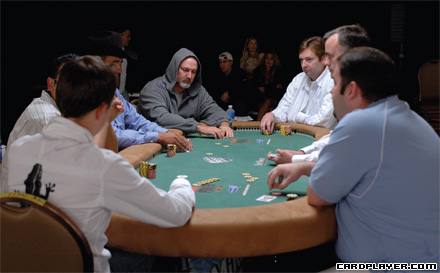
During the 2006
World Series of Poker, I played in several events, one of which was the $2,000 no-limit hold'em shootout. Shootout tournaments have a different structure than regular tournaments, in that each table plays down to one player, and those players advance. Although shootouts are not the most popular structure for a tournament, there have been some at many major tournaments for many years. This column describes my experience in this shootout event during the
WSOP.
When the staff made the announcement that the tournament was starting, my table had only three players. The rule at the
WSOP is that no table can start play until there are at least four players present. Within a minute, a fourth player showed up, followed shortly by two more players; we were sixhanded and playing, but all 10 stacks were being dealt in. During the first hand, the player to my left commented that not only were we sixhanded, but so were all of the other tables. Many players do show up late, but as I looked around, I also noticed that not a single table had more than six players. It was impossible that this was a coincidence. I called a floorperson over and asked him why there were so many seats open, and he responded that all of the seats were sold and we were playing 10-handed. I had a weird feeling that they had screwed up the computer seat-assignment draw. Within a few hands, it was apparent that many of the tables were wondering the same thing that we were. There was just no way that so many people hadn't shown up, and that all tables were missing exactly four players.
Shortly after an announcement was made for all dealers to put the chip stacks of seats No. 3, 5, 7, and 9 into the dealer tray, we were playing sixhanded. You could hear the roar roll through the room; every table's players started talking about it. Why would they change the format of a tournament after it had already started? Nowhere had this tournament been advertised as a shorthanded, six per table event, a distinction that they give to the other tournaments that start with fewer than nine or 10 players per table. It was clear that almost everyone was surprised that we were going to be playing sixhanded.
Within a few more hands, Tournament Director Jimmy Sommerfeld came on the microphone and clarified the situation. He announced something along the lines of, "Apparently, everyone doesn't understand how a shootout tournament works. We have 600 players at 100 sixhanded tables; everyone who wins his table will get at least double his money back."
Right after Jimmy's announcement, a commotion began brewing on the other side of the room. Harry Demetriou was standing and screaming. He was screaming bloody murder. He was ticked off at the "structure change," and was making sure that everyone knew about it. There were lots of people who were not happy about it, but none more than Harry.
Why was everyone so upset? Because shootouts, like most tournaments, traditionally have been started with nine or 10 players at a table. If that is not the case, the tournament is labeled a shorthanded event. 2005's
WSOP $1,500 limit and no-limit hold'em shootout tournaments started with 450 and 780 players, respectively. Both started with 10-handed tables, and there was no reason to think that this event would be any different.
The staff of the
WSOP has an obligation to run the tournaments in a fair and traditional manner. It isn't easy playing tournament poker when the rules change from place to place. It also isn't easy to run them. Of course, they are not going to be able to list every situation that will come up or explain every procedure that will be used in a tournament beforehand. They have to wing it with a temporary staff and make do with what they have. But this was different; they had changed the structure of the tournament after it had already started. If a tournament is going to be run differently than what is expected, it should be clearly identified.
Mike Sexton said to me during the first break, "If you had asked all 600 players before the tournament started if they thought we would be playing 10-handed or sixhanded, 599 of them would have said 10." And he was right.
 Michael O'Malley is the poker room manager for www.PartyGaming.com, and can be reached at rzitup@rzitup.com. His website is updated regularly at www.rzitup.com.
Michael O'Malley is the poker room manager for www.PartyGaming.com, and can be reached at rzitup@rzitup.com. His website is updated regularly at www.rzitup.com.







